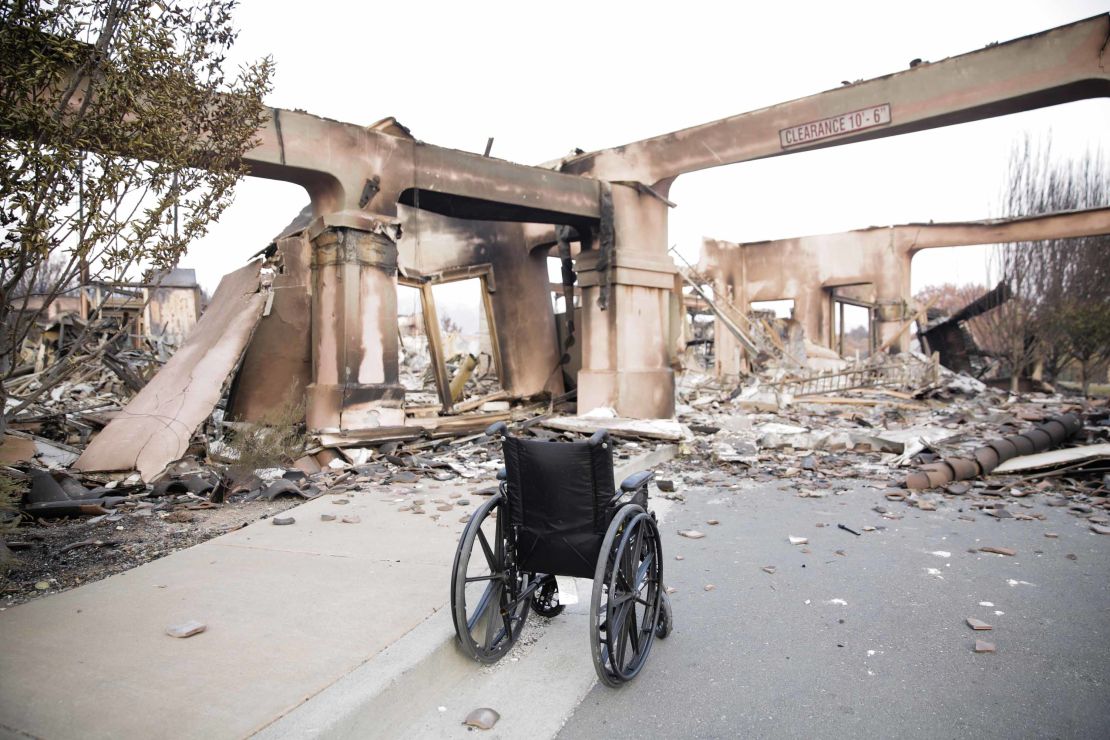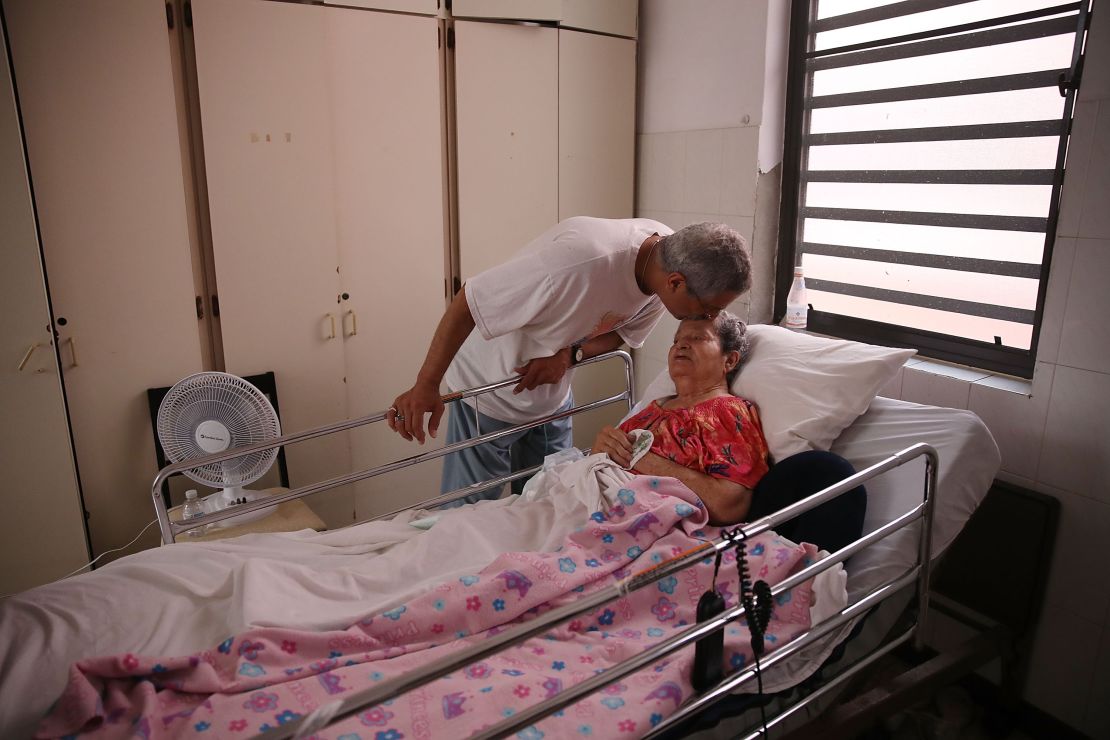Story highlights
Seniors tend to die at disproportionate rates after major disasters
Many seniors with chronic illnesses can quickly deteriorate in a disaster setting
Recent wildfires in California and hurricanes in Florida, Texas and Puerto Rico have put a spotlight on vulnerable seniors – including a number of deaths that authorities have said were preventable.
“The bulk of them are in their 70s and 80s, so there is that commonality,” Sonoma County Sheriff Rob Giordano said of the first wildfire victims to be identified during a press conference Thursday.
The majority were found in their homes, reduced to “ashes and bones,” Giordano said. Several were identified using medical implants, such as a hip replacement, with unique serial numbers.
On Sunday, the Sonoma County Sheriff’s Office identified four more victims of the fires, all over the age of 70.

Over a dozen residents of a Florida nursing home died in the month after Hurricane Irma knocked out the facility’s air conditioning.
Just weeks later, after Hurricane Maria hit Puerto Rico in September, some were trapped in homes and shelters, unable to get the crucial medical care they needed.
The elderly have died disproportionately in disasters around the world, including a 2004 tsunami in Indonesia, a 2003 heat wave across Europe and a 1995 earthquake in Japan, according to a United Nations report.
Experts continue to grapple with how best to protect the elderly, who face difficulties evacuating from disasters, more health issues on average and perhaps even a greater share of the psychological impact.
“You can’t always predict an emergency event,” making preparedness key for seniors, said Ashley Chambers, communications director for the Florida Department of Elder Affairs.
To evacuate or not
Many adults can’t easily evacuate – some because they don’t drive, others because they are physically unable, according to research.
And some people refuse to evacuate in the first place.
“Some seniors don’t want to leave a home that they’ve been in all their lives, because the future may be uncertain,” said Vicki Eichstaedt, a spokesperson for the American Red Cross.
Others feel they might be better off remaining in a facility that has the means to take care of them.
“This is a very nice, sturdy concrete building,” Herbert Dreisbach, a 94-year-old resident of a nursing home in Jacksonville, Florida, told CNN before Hurricane Irma. “It’s still better than being at a facility that would not be properly prepared to take care of us.”
“Not all residents … should be evacuated,” Lisa Brown, a psychology professor and director of the Trauma Program at Palo Alto University, previously told CNN.
Brown, who is also Dreisbach’s daughter, showed in past research that nursing home residents with dementia had an increased risk of death in the months following a 2008 hurricane if they had evacuated.
“Those who can safely shelter in place may fare much better than those who are physically evacuated,” Brown said. “There’s not a one-size-fits-all, is the main point.”
Eichstaedt, who called from the Sonoma County Fairgrounds where there is a makeshift shelter, said that many seniors refuse to evacuate because they have pets, which may be their only companions.
“It may be the only connection they have to their old life,” Eichstaedt said.
The fairgrounds were equipped with a pet-friendly shelter, with veterinarians to take care of sick and aging pets, too. “That’s been a blessing for many seniors,” she said.
A matter of health
In emergency situations, once-manageable health conditions, like diabetes or an infection, can quickly spiral out of control.
CNN previously told the story of Josefina Alvarez, 62, who escaped to a shelter outside of San Juan before Hurricane Maria. She remained stuck there for nearly two weeks before doctors were finally able to treat an abscess that could have turned into a life-threatening infection.
“Nobody is taking care of us,” Alvarez said at the time.
About three out of every four Americans 65 and older have multiple chronic health conditions, such as high blood pressure and obesity, according to the US Centers for Disease Control and Prevention.

After Hurricane Katrina in 2005, nearly half of those who died were 75 or older – despite making up less than 6% of the state’s population, according to one study. While most of these deaths were drownings or injuries, 11% were caused by heart conditions.
Before Hurricane Irma, nursing homes in Florida stocked up on supplies, and pharmacies issued early refills of medications for people in evacuation zones.
The Florida Health Care Association, which represents 81% of the state’s nursing centers, instructed each facility to prepare seven to 10 days of medication, oxygen and other medical necessities for each resident, according to spokesperson Kristen Knapp. The association does not represent the Hollywood facility where multiple residents died last month.
Even without a health issue, age can take its toll on the body.
An average healthy person can survive 100 hours without water if they’re not becoming dehydrated because of injury or temperatures, according to Dr. Paul Auerbach, a professor of emergency medicine at Stanford University who worked with rescue teams after earthquakes in Nepal and Haiti. They can even survive two or three weeks without food.
But for the elderly and infants, that time period can be much shorter, he previously told CNN.
Older adults are also more sensitive to extreme temperatures, making them more susceptible to heat stress and hypothermia, according to the CDC.
The exact causes of death of the Florida nursing home residents have not been announced, but a number of the 141 residents who were evacuated were treated for heat-related issues.
In Sonoma, Eichstaedt said that seniors with difficulties breathing or respiratory problems have been affected by “smoke and ash in the air.” Even younger and healthier people are wearing masks to avoid the worst air pollution on record for Northern California.
“It’s a big concern,” said Eichstaedt.
In the aftermath
For many people, a disaster often continues long after the fires have been put out or the flooding has receded.
The shelter in Sonoma is only a temporary fix, Eichstaedt said. Many displaced seniors will need assistance getting back home – if they still have a home to go back to.
Seniors may also be more susceptible to scams that happen after a disaster, said Chambers, including unlicensed contractors or people posing as assistance organizations.
“Our senior population is very trusting, and we want to make sure they know what to watch out for,” she said.
Even years after a disaster, some research has suggested that senior survivors are more likely to develop PTSD and other mental health problems – shown in a study of survivors of a 2008 earthquake in China.
“One of the things that we notice is the emotional frailty of many seniors,” Eichstaedt said, “particularly when they face the unknown.”
The prevalence of PTSD in Alabama, Louisiana and Mississippi rose from 15% a few months after Katrina to 21% a year later, found a 2008 study. In that study, however, the highest increases were seen among those aged 40 to 59.
In addition, older adults face a number of stresses that healthy, able-bodied people might not, such as fear of losing their independence or financial stability, according to FEMA.
For seniors who are also low-income, it’s an “extra level of concern,” said Lisa Marsh Ryerson, president of American Association of Retired Persons Foundation.
Many seniors also deal with social isolation, which has long been flagged as a risk factor for mortality.
Marsh Ryerson, whose foundation launched an initiative last year to combat loneliness and isolation among seniors, said that people don’t always think to reach out to elders in their communities while they’re rushing to prepare for an upcoming disaster.
“Check on your neighbors,” she said. “In times of disasters, or often in everyday living, older adults who are vulnerable can often be invisible, and they may not always ask for the help that they need.”
Join the conversation
Vendetta Craig, whose 87-year-old mother was among the survivors of the Florida nursing home, had some choice words about how the deaths at Hollywood Hills reflected society’s treatment of seniors.
“We throw away our elderly,” she said at a press conference in September. “That’s my mother.”
CNN’s Jacqueline Howard and Susan Scutti contributed to this report.






